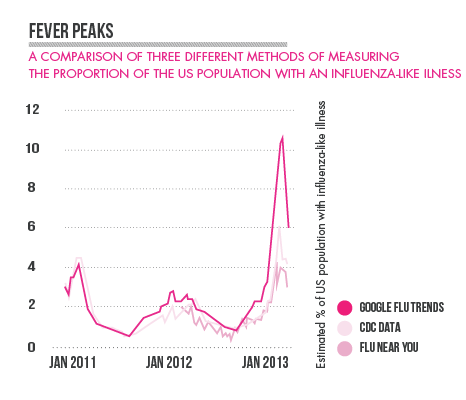![]() 4 minute read
4 minute read
Medical care has been developing rapidly for the last hundred years, and now has opportunity to use new research technologies to improve its efficiency. But how exactly Big Data can aid the Health Care?
“We review the Flu Trends model each year to determine how we can improve — our last update was made in October 2013 in advance of the 2013-2014 flu season. We welcome feedback on how we can continue to refine Flu Trends to help estimate flu levels.”
There is a bright future for Big Data trends prediction
according to Google spokesperson.
Tracking the flu
by search terms
As with any question and request people go to search answers online in search engines creating more data, Google experts noticed the correspondence of search terms and actual flu epidemic. According to their insight, Google Flu Trends can estimate current flu activity around the world in near real-time with the aggregated Google search data. The program enables detecting viruses and epidemics on early stages. Consequently public health officials and health professionals are able to respond better and faster to seasonal epidemics and pandemics as data is up-to-date and updated every day.

[nbsp]
Google Flu Trends data was compared with official influenza surveillance data and claimed to show a very close match with the[nbsp]traditional flu activity indicators. Meanwhile, several times Google’s Influenza report showed a significant difference between Google and Traditional flu surveillance data in US. Mismatched data caused much conversations and theories to explain the difference.
Medical industry has an enormous amount of data and proverbial village is required to structurise and analyse it. One such village is Optum Labs, the collaboration between UnitedHealth Group’s Optum Health and the Mayo Clinic, who saw an opportunity in collecting claim data with data from electronic health record data and make it available for researches, scientist and clinic translators in order to improve healthcare system and make it more cost-efficient. At the moment Optum Labs cooperate with more than 20 partners in over 50 different projects towards common goal. Optum Labs’s priority is to enable clinicians to connect insights from big data directly to the care of an individual patient.
Reduce medical
care costs
Illustrating the possibilities of wide usage of Big Data in health care by Optum Labs, it is impossible to miss the case about diabetes drugs. Optum Labs together with their partners conducted a research about efficiency of diabetes medicines. Taking in consideration data about patients suffering from diabetes, their demographic parameters, attitude to drugs consumption and drugs offered on the market Optum Lab found a way to reduce the health care costs. There are four different drugs on the market, one of which is cheaper generic drug, others are more expensive, new type drugs. Conducted study showed that all these types of drugs perform with similar outcomes in terms of quality adjusted life years, but the costs are dramatically different. Eventually, research created an opportunity to intervene and lower the cost of healthcare as patients can safely request cheaper generic drugs for diabetes.
Governments see an opportunity in Big Data to improve health care system. In US, the White House opened a new position and hired DJ Patil as a first in history Chief Data Scientist. The mission of the position is “Responsibly unleash the power of data for the benefit of the American public and maximize the nation’s return on its investment in data”. It is expected to produce large health care cost reduction based on researches and insights provided by DJ Patil.
Insight box
We can only guess how Big Data will influence on our world. One we know for sure – Health Care will be different. New methods of obtaining the data and analyzing it brings fast results. Health care will become more efficient and less expensive – available for population. The development of Health Care, which has rather stayed still for the last decades, will rocket in terms of years.



